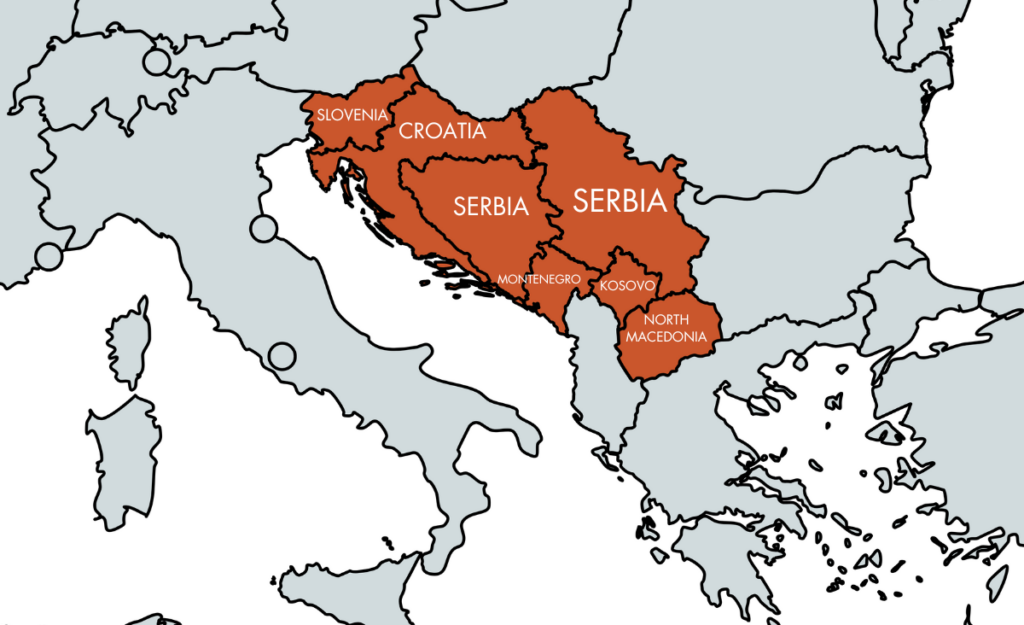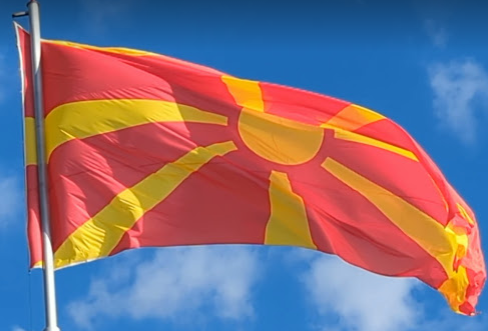I’m currently in Skopje, the capital of North Macedonia.
And that simple statement is actually very complicated
I asked Petros, our Greek tour leader, and Naum, our local guide, whether Macedonians are an ethnicity or a nationality or a geographical grouping. And I never got a straightforward answer. But they got into a heated discussion. At first I thought it was a friendly debate. But it became clear as I listened to them that sensitivities on this naming issue lie very close to the surface.
Etymology
“Macedonia” is a Greek word (Μακεδονία). The name comes from the ancient Greek mythological figure Makedon (Μακεδών), son of Zeus (or of other parentage depending on the story you read). Makedon was considered to be the father of the Macedonian people. The name Makedon is related to an ancient Greek adjective meaning tall and slim.
History
The ancient kingdom of Macedonia goes back to roughly the 8th century BCE. It was a small kingdom until the reigns of Philip II and his son Alexander III (the Great).

Under Alexander, in the 4th century BCE, the kingdom became an empire. Gradually that empire disintegrated, largely due to power struggles within the kingdom itself. Eventually the Romans came along and in the 2nd century BCE they finally abolished the Macedonian monarchy and dissolved the kingdom. It became a province of the Roman empire.

After the fall of Rome in the 5th century, Macedonia was in the Eastern Roman Empire, otherwise known as the Byzantine Empire. By the time of the Ottoman conquest in 1453, Macedonia pretty much ceased to exist as a distinct entity.
Geographical
In the 19th century, the name Macedonia began once again to be applied to this region, but only as a geographical region and not in any political or administrative capacity.
This map is probably the maximum range of what might be considered the region of Macedonia. There is no international agreement about this. And this region is in no way any kind of political entity.
Political
Today we visited the Museum of the Macedonian Struggle for Independence here in Skopje. Most of the museum’s displays are about the struggle for independence from the Ottoman empire. But as Petros mentioned to me privately later on (since he knows I write this blog), Macedonia was just a small part of the Ottoman empire, and the struggle for independence wasn’t unique to Macedonia. Greece fought and won a war of independence from 1821 to 1831. Serbia achieved independence in 1867, and after the First and Second Balkan Wars of 1912 to 1913, a large portion of the region of Macedonia became part of the Kingdom of Serbia. And after their defeat in World War I, the Ottoman empire was dissolved.
Interestingly, at the museum there was no mention at all of Macedonia being absorbed into Serbia. They completely skipped over that part of the history.
Kingdom of Yugoslavia
In 1918 Serbia (and thus Macedonia) merged with Croatia and Slovenia to form the Kingdom of Serbs, Croats, and Slovenes. Later the name changed to the Kingdom of Yugoslavia. In 1941 the Axis powers invaded and quickly conquered Yugoslavia and carved it up. Most of the Macedonian region was divided between Albania, Italy, and Bulgaria. After the Fascist government of Italy fell in 1943, Germany took direct control over their Balkan territories.
Communist Yugoslavia
After the Germans were driven out in 1945, the Kingdom of Yugoslavia was restored, but the Communist Partisans of Josep Broz Tito, who had led the fight against the Axis powers in the region, seized political power. By the end of the year the King was deposed and the monarchy abolished. Tito’s Communists established the Federal People’s Republic of Yugoslavia that included the same territory as the former kingdom.

With the breakup of Yugoslavia, Macedonia achieved independence in 1991.
Semantics
At first the name of the new nation was “The Republic of Macedonia.” But this resulted in a dispute with Greece that was only resolved in 2018 with the signing of the Prespa Agreement.
The naming issue had actually preceded Macedonian independence. Greece and Yugoslavia had been an issue in relations between Yugoslavia and Greece. But independence reignited the issue.
The Prespa Agreement held that the name of the Republic of Macedonia would change to the Republic of North Macedonia. It also held that the new name would be used for all purposes, domestically as well as internationally. It allowed that the citizens of North Macedonia would be called Macedonian/citizens of the Repubic of North Macedonia. But it explicitly stipulated that they are not related to the ancient Macedonians. It also stated that the terms “Macedonia” and “Macedonian” refer to different historical context and cultural heritage for each country. In Greece these terms denote the area and people of its northern region, as well as the Hellenic civilization, history and culture of that region. In North Macedonia these terms denote its territory, language and people, with their own, distinctly different, history and culture.
It seems to me that both sides feel they had to capitulate to the other. Greece didn’t want the other country to be able to use the term “Macedonia” at all. And North Macedonia didn’t want to change their name.
So what?
Is this really a big deal? To me it kind of seems silly to get all worked up about it. But clearly it matters to the people here and in Greece. And I can’t really put myself in their shoes.
The Prespa Agreement was unpopular in both countries. It barely passed in either country’s Parliament. In Macedonia 69 out of 120 MPs voted in favor. The president vetoed it, but the Constitution only required a simple majority to overturn the veto, and it again past with 69 votes. A non-binding referendum was held on the name change, but there was only a 37% turnout, with most Macedonians boycotting the vote.
In Greece the margin was just 7 votes, 153–146. Following the vote there were demonstrations in the streets of Athens, with marchers holding banners reading “Macedonia is Greek.” Polls suggested two-thirds of the Greek people opposed the agreement. Many feared that their neighbor to the north had designs on the Greek region of Macedonia. (Interestingly, twice during our tour of the Museum of the Macedonian Struggle, the guide made sure to tell us that his country has no such designs.)
Another part of the issue is that the ancient Greek hero, Alexander the Great, was born in the Greek region of Macedonia. And yet the international airport in Skopje bears the name “Alexander the Great,” as does a major highway through North Macedonia. As part of the Prespa Agreement, the Republic of North Macedonia has to “review the status” of any public buildings or monuments that refer to ancient Greek history.
I think by now both sides have accepted the situation without being happy about it. Both nations have bigger issues to deal with. Especially in North Macedonia, where corruption is a serious problem and faith in the government is at something like 8% approval, there’s a lot to be done.
I’ll write a proper post about my time in North Macedonia later. But I wanted to ruminate on all this while it was fresh in my mind.



Joy Sherman
Thanks for the great history lesson, Lane! It was intensely interesting! Looking forward to your next post.
Joy
Lane
Joy, I’m so glad you found it interesting. I did too!
Timothy Welch
I remember hearing over and over again the dispute about the name and even the existence of North Macedonia, while visiting “North Macedonia”. Of course, that argument was from the Greeks. Isn’t Skopje the most unusual city? If I saw one more statue.…
Lane
It’s an interesting conflict. And a great example of how compromise is a way for both sides to lose so that neither side wins.
The statues actually made me laugh. Don’t try to convince the Macedonians that size doesn’t matter! And I neglected to mention that they officially renamed the Alexander the Great statue to “Warrior on a Horse” and the Philip of Macedon statue to “The Founder of Heraclea.”